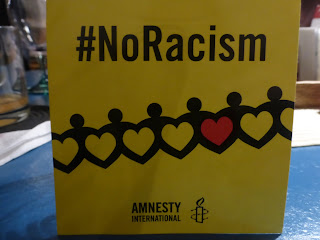http://www.derwesten.de/staedte/hagen/besuch-aus-rumaenien-und-bulgarien-vorurteile-abbauen-id12399449.html
There was an article about the project in the newspaper today. This is what it says:
Overcoming langugage barriers, fighting prejudices
Kaufmannsschule II receives Romanian and Bulgarian teachers and students. Funded by the EU
By Marc Miertzschke
Hohenlimburg. The European idea was taken in quickly, the language barrier and prejudices were overcome: Students and teachers from three European nations met at Kaufmannsschule II (K2) in a European exchange programme. Following the slogan "Becoming a multicultural European" 14 students and teachers from "Nichita Stanescu" situated in Romania's capital Bucarest and from "Vasil Levski" in Dolni chiflik in Bulgaria visited K2.
Headteacher Thomas Vogl welcomed the delegations for a week of getting to know and meeting each other. The programme consisted of attending lessons, an intercultural training and a presentation about migration. Moreover the week was used to plan the project in the coming years: The strategic partnership has received a funding f 25,000 € as an intercultural project for two years by the European Union. A visit to Romania is being planned for next year, the visit to Bulgaria is scheduled for the year after. "We would like to help students overcome their stereotypes and prejudices against other nations with this project", says Thomas Vogl. "When students of the same age meet in person and talk about their interests or hobbies they quickly realise their similarities." Furthermore this exchange is a good opportunity to use the English learnt at school in everyday situations, says Vogl.
After a few reservations at the beginning this worked out quickly, says Sandra Hansen, teacher of German and English.
A good mixture
"The exchange was very successful, a good mixture of personal encounter, intellectual input and joint discussion. I think that most of us feel more like a European and have broadened their views."
This positive perception was supported by Niculina Chiper, teacher at the Romanian school: "This week has opened many interesting perspectives for us which we will investigate deeper." Apart from the topical input the participants had fun: They looked at multicultural Hagen. For many it was their first visit to Germany: "Hagen and Hohenlimburg are lovely cities, very cosy, I also liked Cologne a lot", says Nikolay Atanasov (18), in his final year in Bulgaria, about his impressions. "Everyone we have met here was very nice. I have made new friends."












































